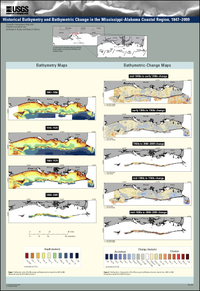Historical bathymetry and bathymetric change in the Mississippi-Alabama coastal region, 1847-2009
Links
- Document: Report (html)
- Data Release: USGS data release - Historical Bathymetry in the Mississippi-Alabama Coastal Region: Bathymetric Soundings, Gridded Digital Elevation Model, and Hydrographic Sheets (Ver. 2.0)
- Download citation as: RIS | Dublin Core
Abstract
Suggested Citation
Buster, N.A., Morton, R., 2011, Historical bathymetry and bathymetric change in the Mississippi-Alabama coastal region, 1847-2009: U.S. Geological Survey Scientific Investigations Map 3154, Map: 48 inches x 70 inches, https://doi.org/10.3133/sim3154.
ISSN: 2329-132X (online)
| Publication type | Report |
|---|---|
| Publication Subtype | USGS Numbered Series |
| Title | Historical bathymetry and bathymetric change in the Mississippi-Alabama coastal region, 1847-2009 |
| Series title | Scientific Investigations Map |
| Series number | 3154 |
| DOI | 10.3133/sim3154 |
| Year Published | 2011 |
| Language | English |
| Publisher | U.S. Geological Survey |
| Publisher location | Reston, VA |
| Contributing office(s) | St. Petersburg Coastal and Marine Science Center |
| Description | Map: 48 inches x 70 inches |
| Additional Online Files (Y/N) | Y |


